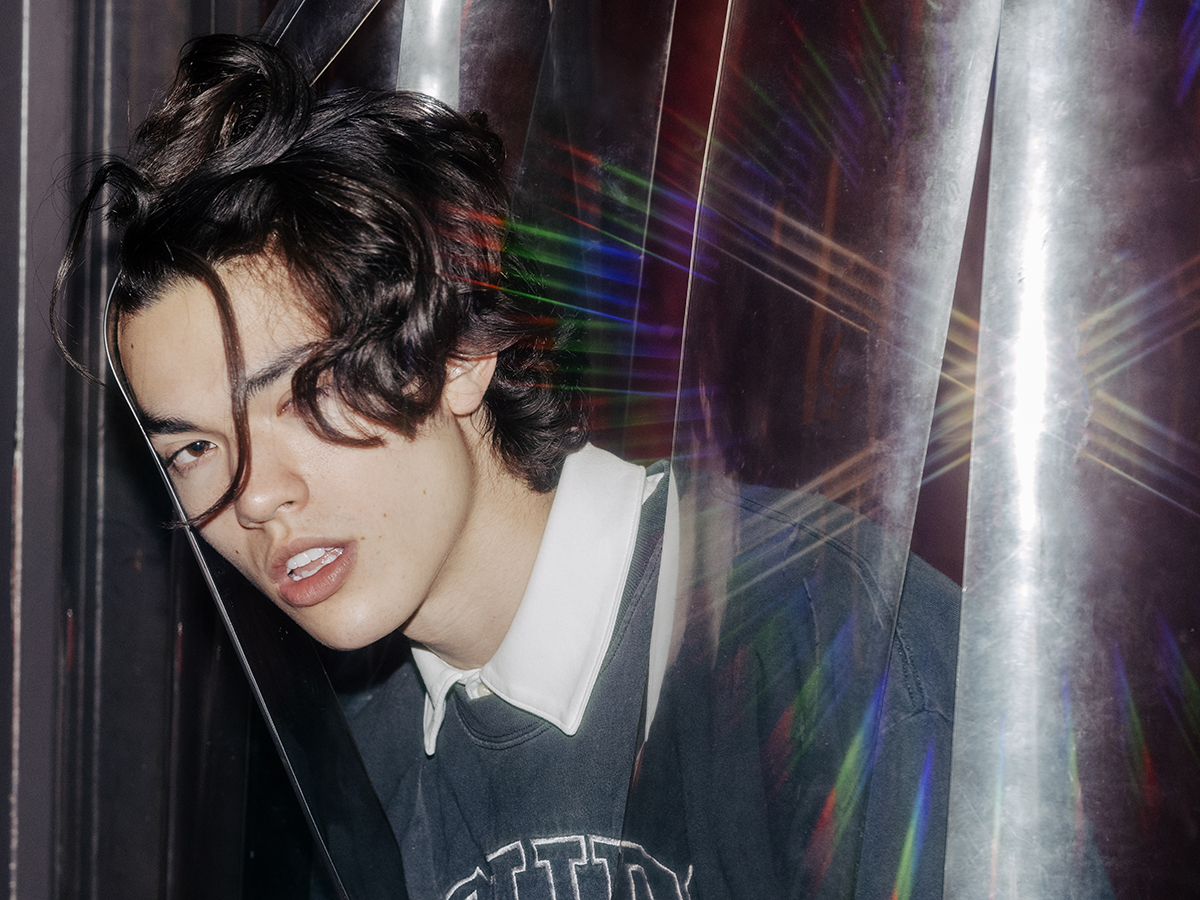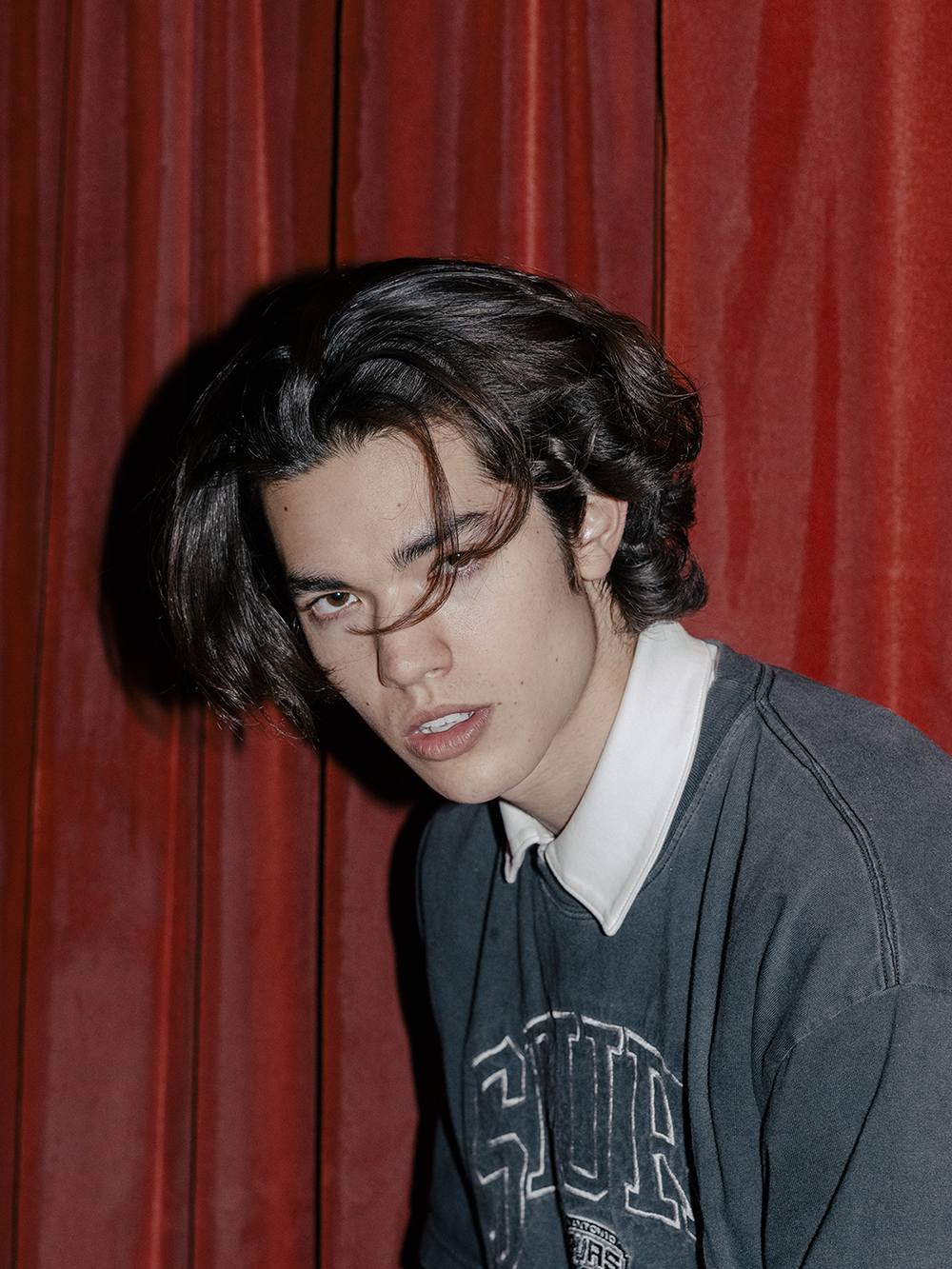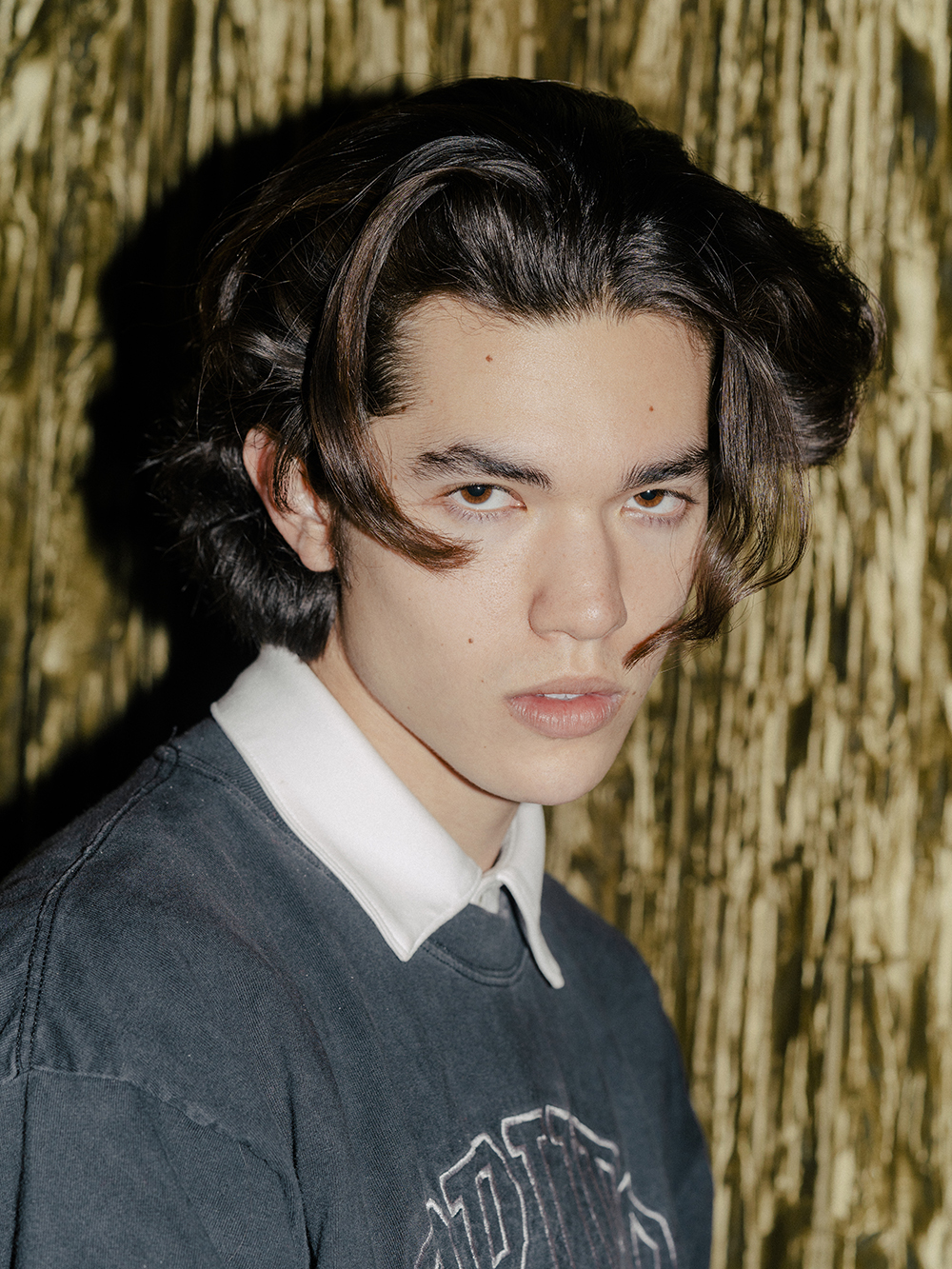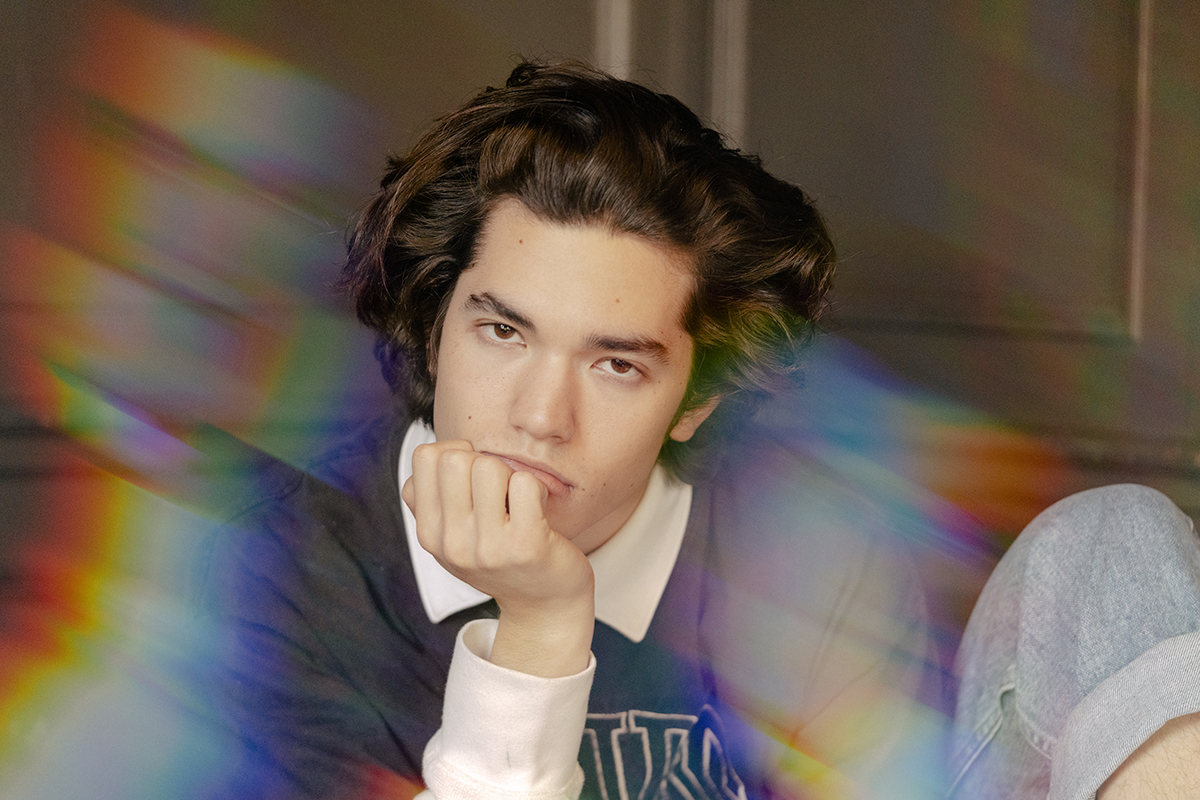“Isn’t he an angel, Dad? The most beautiful thing you’ve ever seen?”
On the balcony of Bowery Ballroom in New York City, a girl no older than nine is swooning over pop’s brand new heartthrob. She screams along to every one of his songs, gets jealous over the front row as they gaze into his eyes, and throws heart-shaped hand gestures up in the air in the hope that he might see them. She squeals, grabbing her mother’s side: “This is the best night of my LIFE!”
The boy on stage is Conan Gray, and this is the life he leads now. Just over 18 months ago, he was a kid growing up in suburban Texas, minding his own business at school, keeping to his small friend group and getting the grades that would help him get out of his town and into a college on the west coast; a distant dream of his. But when he got home, the self-confessed “outsider” was preaching his goofy and intimate internal thoughts to a million-strong crowd of YouTube followers right out of his bedroom.

To kids like Conan — weird kids, or the ones who enjoyed solitude too much to fit in with the “cool” crowd — he’s the best friend they’d always hoped for. “Nobody cared that I existed in high school, so it’s really weird now,” he grins, backstage in the green room the day after his sold out Manhattan show. He’ll play another in this Brooklyn venue in a few hour’s time. “I still remember the first day I moved to Texas and went to middle school. I hadn’t said anything yet, and the boy sat in front of me turned around and shouted: ‘People don’t like the kids who don’t talk!’”
It’s no surprise that Conan wasn’t an effervescent kid desperate to be noticed back then: that middle school was the first of three he’d enrol in throughout the sixth grade alone. Before YouTube and music took over his life, Conan found himself shifting from one state to the next. His childhood, he says, was “rough”.
Throughout that time period, home became something more transient than a brick-house in suburbia. His family — an older sister and two married parents — were carted off to Hiroshima, Japan (Conan is half Japanese) to care for his ailing grandfather. When they returned to California, his parents divorced. From then on, Conan had to make friends in new places just as quickly as he’d be moved on. The final stop came at the culmination of a story he recounts in a self-illustrated YouTube video: when his mother and father moved separately to Texas and found their own feet. For Conan, finding his own took a little more time.
Instead, the discovery of YouTube was a formative moment for him. All of a sudden, the creative kid who barely had time to get to know people had access to thousands of vloggers who’d transformed the mundanity of their everyday lives into relatable content online. He heard stories and forged relationships he’d barely encountered before, and saw it as an opportunity to express his obsession with drawing and music. In the internet, this ostracised kid found his one constant.
“It was wonderful because I could sing for nobody and everybody there!” he says now, playing with the collar of his polo shirt. His channel, made-up of vlogs and original tracks he’d record in his room, is something he keeps up with — even when he moved back to California to study filmmaking at UCLA. “But I don’t think I ever wrote music with the thought of other people listening to it. For me, it was more of a coping mechanism and an organisational tool. I’m a psychotic nerd and, for me, writing is something I always do because I kinda have to, whether I like it or not. It gave me the chance to speak without making any noise.”
It was those first comely covers and sweet self-penned songs — like The Other Side, a swooning guitar track that gained new life when it was reproduced this year — that helped Conan place his voice at the centre of his own narrative. It was proof that he could amass hundreds of thousands of followers for candid stories about his own life but still had a knack for something bigger. Like the YouTube-bred stars that preceded him, freed from the shackles of their ‘internet kid’ affixes, he too was about to break out.
“The internet does that,” he laughs. “It makes really quiet kids quite famous without having to leave their bedrooms.” But if the happy clappy nature of YouTube stars literally makes you wince, worry not. The subject matter Conan dwells upon in his songwriting is for relationship cynics and moody, heartbroken Gen Zers.

It’s no surprise that Taylor Swift’s Teardrops on My Guitar was the first video he watched on YouTube, or that he credits Lorde as the artist who changed his life. ‘Angst’ is the word we throw at each other throughout the course of our conversation. “There’s something really nostalgic and resonant about teen angst,” Conan says, eyes wide. “It’s when your emotions are so high strung that they’re all over the place. From 14 to 22, you’re a ball of fire.” He’s in the thick of it right now, he says, “and it doesn’t seem like I’m gonna stop anytime soon.”
In a time where pop stars are expected to have more of an edge, the niceties of kids like Conan feel like something to celebrate.

On Lookalike, perhaps his most traditionally-formed cut from his debut EP Sunset Season, he asks a former partner of their new bae: “When you look in his eyes, do you think of mine?”. It’s a classic pop ballad powered by that withering and pathetic feeling you get when someone you once loved passes on to someone new. Crush Culture meanwhile, is a buoyant anti-PDA anthem for everyone who hates being surrounded by their loved-up friends. Conan wrote them all alone in his senior year of high school before he signed his record deal. It was Dan Nigro, a producer who’s worked with Sky Ferreira, Empress Of and Carly Rae Jepsen, that transformed them into these moody pop sad boy anthems.
Sunset Season, released last November, was our first fully-formed look at pop star Conan, and he hasn’t slowed down since. “We looked at the folder that had all the songs I’ve written since the EP that we wanted to put on the album, and it’s 52 songs long,” he grins. Like his first outing, everything on Sunset Season’s greater impending follow-up is self-penned (“We tried to put me with a bunch of writers, and it was fun, but there’s just too many songs that I’ve written alone,” he claims). It chronicles the next chapter in Conan’s life: college. After the first EP took off, a bunch of big-name producers — the same ones who shaped some of his favourite pop records — jumped into the ring, itching to work with him. Those names are off limits for now, but he has promised that “once you look at the song credits, you’re gunna, like, shit your pants”.

For now, that college life at UCLA is on hold while the whole pop thing unfolds. “It’s very hard to be Hannah Montana,” he says with raised eyebrows, describing the stress of juggling music, touring and trying to stay on top of a full time filmmaking degree at the same time. “It really was not the best of both worlds! All my friends were like, ‘Conan, you look dead’ — and I felt it!” He’s taking a little time off to recalibrate. A counsellor at school says he can do that for seven years. “I’m really, really excited for the phase of my life where I’m like, 35 and no one gives a shit about me!” he jokes. “I’ll have two kids and a dog and I can just write songs for other people.”
Nowadays, the same kids who bothered Conan Gray could just be the ones front row at his hometown gigs, “sending him 1000 DMs a day”. Being on the periphery of fame does funny things to people, but Conan does genuinely seem to have his feet planted firmly on the ground now; perhaps because it took him a little while longer to find them in the first place. Or maybe it’s because the tangibility of stardom is still setting into his bones; an internet kid now dealing with an IRL fame that’s growing more mad with each passing day. But a quick look over the crowd at any of his sold-out shows tells you one thing easily: Conan Gray is a proper pop star. Whether he’s realised that remains to be seen.
Credits
Photography Ryan Duffin
